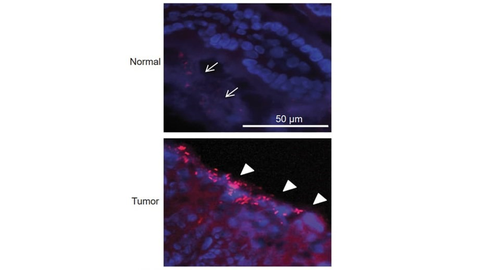Mar 22, 2022
New Funding for Research on the Role of Microbiome in Early-Onset Colorectal Cancer

Bacteria infiltrate intestinal tumors. Healthy intestinal tissue (top) and an intestinal tumor (bottom) in mice. Bacteria are shown in red and cell nuclei in blue. The arrows show spatial separation of bacteria surrounding healthy tissue, while tumor tissue is invaded by bacteria (indicated by arrowheads).
Scientists aim to provide important clues on how microbiota signatures can be used to detect early-onset colorectal cancer and possibly also be modulated to influence cancer development.
A new research consortium aims to investigate the role of the microbiome in the development of early-onset colorectal cancer. The researchers want to develop an early warning system for colorectal cancer and study whether the microbiome can be leveraged to prevent the disease. The consortium is led by a Dresden scientist and is a collaboration between research groups from Munich, Heidelberg, Kiel, Rostock, and Aachen, The German Federal Ministry of Education and Research (BMBF) has funded the project with a total of 3.2 million euro.
In the recent years, older patients have been diagnosed with colorectal cancer less and less frequently due to effective screening. In contrast, the incidence of colorectal cancer onset in patients under fifty years of age has more than doubled. Current data suggest that changes in lifestyle play a central role in increasing the risk of the disease. Lack of exercise, obesity, and Western diet influence the gut microbiota, which in turn impacts the development and growth of colorectal cancer. The relationship between diet, microbiota, and colorectal cancer is now being investigated by the TU Dresden scientists together with colleagues from Munich, Heidelberg, Kiel, Rostock, and Aachen. Researchers are starting the "Microbiota-based prevention of colorectal cancer in young people" research project scheduled to run for an initial period of four years.
"The aim is to identify the role of bacteria in the development and spread of colorectal cancer and to use the results to derive new therapeutic approaches," says Prof. Sebastian Zeissig from the University Hospital Dresden and Center for Regenerative Therapies Dresden (CRTD), who leads the new consortium. The German Federal Ministry of Education and Research (BMBF) has supported the Mi-EOCRC consortium with a total of 3.2 million euro.
In the first step, researchers plan to identify bacteria and bacterial metabolites that enable the early detection of colorectal cancer in people under 50 years of age. The study will focus on people with a familial risk of colon cancer or obese people. The results will be used to study which bacteria and bacterial products regulate the development of cancer and how these are specifically influenced by diet. "In this way, we want to develop new approaches to specifically manipulate the microbiota," says Prof. Michael Albrecht, Medical Director of the University Hospital Dresden. "This research project will form the foundation for an extensive communication campaign entitled ‘Colorectal Cancer in Young People’ which is intended to educate about risk factors and encourage people to undergo screening procedures."
"Lack of physical activity and the resulting obesity are undoubtedly some of the biggest risk factors for the development of colorectal cancer. Our diet, which is often high in fat and protein and low in fiber, also plays an important role. While a healthier diet is often recommended by physicians, in practice implementation of these recommendations is rarely successful. However, if cancer-regulating effects of diet are mediated via the microbiota, this could offer new opportunities to target gut bacteria and influence them to prevent cancer development," says Prof. Sebastian Zeissig.
Prof. Sebastian Zeissig is the head coordinator of the newly formed research consortium. His research group will also contribute to the project by studying the role of bacteria in early colorectal cancer metastasis. Prof. Jochen Hampe and his research group at the CRTD will investigate genetic contributions to colorectal cancer. Prof. Sven Engesser, chair of Communication at the Institute of Media and Communication at the TU Dresden will design the communication campaign that will accompany the research projects.
Scientific contact:
Prof. Dr. med. Sebastian Zeissig
Medizinische Klinik I - Universitätsklinikum Dresden
Center for Regenerative Therapies Dresden (CRTD)
Technische Universität Dresden
Fetscherstr. 105, 01307 Dresden
Tel: +49 351 458-19171
Email:
